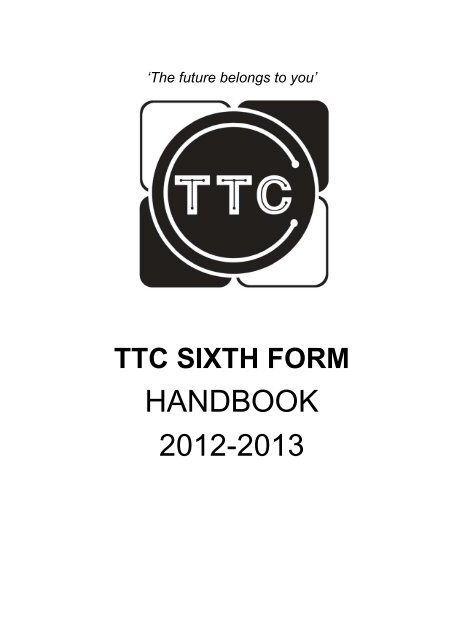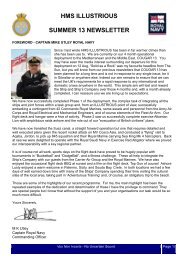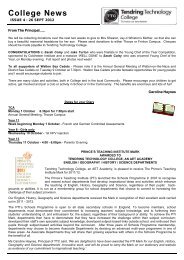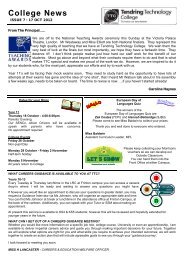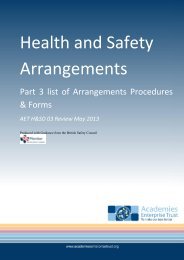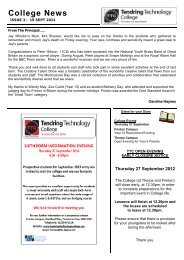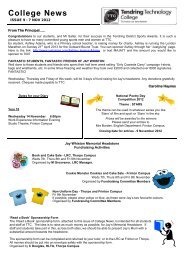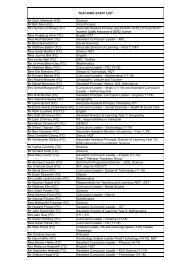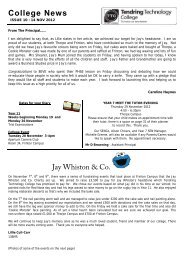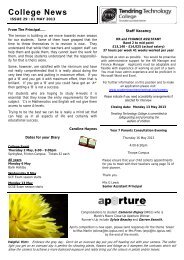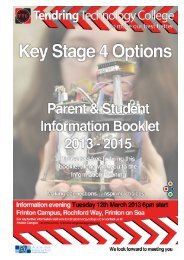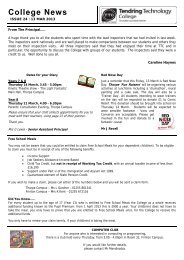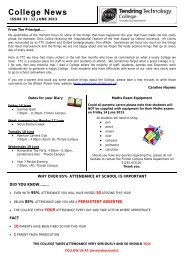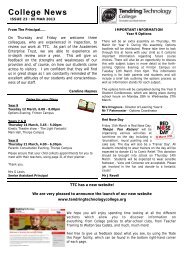TTC SIXTH FORM - Tendring Technology College
TTC SIXTH FORM - Tendring Technology College
TTC SIXTH FORM - Tendring Technology College
Create successful ePaper yourself
Turn your PDF publications into a flip-book with our unique Google optimized e-Paper software.
‘The future belongs to you’<br />
<strong>TTC</strong> <strong>SIXTH</strong> <strong>FORM</strong><br />
HANDBOOK<br />
2012-2013
Contents<br />
1. Welcome to <strong>TTC</strong> Sixth Form<br />
2. <strong>College</strong> Mission Statement<br />
3. Aims and Objectives<br />
4. The Sixth Form Team<br />
5. The Sixth Form Experience<br />
6. Attitude to Learning and Ethos<br />
7. The <strong>TTC</strong> Sixth Form Code for Success<br />
8. Pastoral support<br />
9. Tutor Groups<br />
10. The Role of the Tutor<br />
11. Assemblies<br />
12. Extra-Curricular/Enrichment/Community<br />
13. Induction<br />
14. The Curriculum<br />
15. Attendance<br />
16. Absence<br />
17. Behaviour<br />
18. Monitoring<br />
19. Deadlines<br />
20. Examinations and Assessment<br />
21. Examination Entries<br />
22. Target grades<br />
23. Progress review<br />
24. Student voice<br />
25. Positions of responsibility/Sixth Form Council<br />
26. ICT<br />
27. 16-19 bursary fund<br />
28. ISIC, NUS and UCAS cards<br />
29. Private Study<br />
30. Home Study<br />
31. Cafeteria<br />
32. Driving<br />
33. Key Dates<br />
James Saunders Page 2 31/08/12
1. Welcome to <strong>TTC</strong> Sixth Form<br />
Thank you for choosing <strong>Tendring</strong> <strong>Technology</strong> <strong>College</strong> for your Sixth Form programme of study. It will not<br />
be long before you discover just how different it is studying post-16 compared to your experiences in<br />
“compulsory” school.<br />
We treat all our students as individuals with particular aspirations and potential. We want to ensure we<br />
provide the right course for the right student and to ensure that the right student is on the right course.<br />
We look forward to supporting you in your quest for success. The most important difference is the need<br />
for you to take more responsibility for your own learning. You will need to get much more involved with<br />
your subject teachers and your personal tutor. Please check the <strong>TTC</strong> Sixth Form “Code for Success” so<br />
that you understand your responsibilities as a Sixth Form student. This handbook will provide you with<br />
the information to help you make the most of your time here in the Sixth Form.<br />
Your time will pass very quickly so you should maximize the benefits of the courses you are studying and<br />
take full advantage of the extra curricular and community life of the Sixth Form. There is so much on<br />
offer!<br />
Most important, though, is to remember that you are investing the next few years in the <strong>TTC</strong> Sixth Form<br />
so that you can move on to university, further education/training, or directly into employment. You should<br />
bear in mind that although exam qualifications are vital, other skills and experiences are important as<br />
well, to help equip you for life in the future.<br />
On behalf of the team, we wish you a very happy and successful period in <strong>TTC</strong> Sixth Form, and beyond!<br />
<br />
2. <strong>College</strong> Mission Statement<br />
Together, our mission is to be a Sixth Form that:<br />
• fully prepares students for their futures.<br />
• provides a personalised and relevant pathway of progression for each student.<br />
• exploits technological developments to the full.<br />
• nurtures creative students with the skills, knowledge, and motivation to compete on an<br />
international level develops confident leaders ready to dismiss social barriers and take on the<br />
world.<br />
• excels in creativity, mathematics, computing, communication and language across the whole<br />
curriculum.<br />
• achieves success in every league both nationally and internationally.<br />
• adopts innovative design for learning to increase engagement and learning potential, and<br />
• is the provider of choice for students, parents and staff.<br />
OUR AIMS<br />
WE AIM to enable our students:<br />
3. Aims & Objectives<br />
1 To develop to their full potential, whatever their background, ability, race, gender or sexual<br />
orientation.<br />
2 To shape their own future, and the future of the world we live in.<br />
James Saunders Page 3 31/08/12
OUR OBJECTIVES<br />
1 To provide – in conjunction with local Further Education partners – a curriculum that will provide all<br />
students with the knowledge, awareness, skills, and competencies to succeed in their lives beyond<br />
the Sixth Form.<br />
2 To help to equip each student with the best formal qualifications to progress from the Sixth Form<br />
into university, further education, training, or employment. We aim to provide access to every<br />
university course offered throughout the country.<br />
3 To help to reinforce in our young people the positive moral and spiritual values that will help them to<br />
make the world of the future a better place.<br />
4. We share the following beliefs for post 16 learning: that learning meets the needs of individuals,<br />
their future employers, and the needs of the community - that students are encouraged to<br />
complete courses, and that they work in a safe and supportive environment that together with local<br />
further education providers we offer equality of access that learning is effective - that it provides<br />
good value for money.<br />
4. The Sixth Form Team<br />
James Saunders Assistant Principal, Director of Sixth Form<br />
Teacher of Photography<br />
Responsibilities include: Leadership of the Sixth Form, Monitoring Teaching &<br />
Learning of all students within all courses, Examinations and Reporting, ICT<br />
innovation, 14-19 Curriculum<br />
Andrew Croydon Programme Director (GCE)<br />
Teacher of Biology<br />
Responsibilities include: Monitoring of Teaching and Learning of students within<br />
GCE programmes of study, Tutor Programme, Student Voice and Sixth Form<br />
Council, Higher Education<br />
Gareth Wicks Programme Director (Vocational)<br />
Teacher of Business Studies<br />
Responsibilities include: Monitoring of Teaching and Learning of students within<br />
Vocational programmes of study, Careers, Work Experience/Apprenticeships,<br />
SEN<br />
Tim Paternoster Curriculum Director<br />
Teacher of Resistant Materials<br />
Responsibilities include: Co-ordinating Sixth Form Recruitment, IAG within the<br />
Sixth Form, Enrichment, Data analysis, Student Pathways<br />
Clare McInnes Student Support Manager (SSM) – Year 13<br />
Victoria Otto Student Support Manager (SSM) – Year 12<br />
Melanie Lester Student Support Manager (SSM) – Year 12<br />
Responsibilities include: Tracking Student Progress, Pastoral Care, Home-<br />
<strong>College</strong> Contact, Day-to-day administration of the Sixth Form, Acting as support<br />
to the Sixth Form Team<br />
Debbie Lawrence Sixth Form Office Manager<br />
Hannah Wood Attendance Officer<br />
Gavin Cooke Sixth Form ICT Technician<br />
James Saunders Page 4 31/08/12
5. The Sixth Form Experience<br />
Life in the Sixth Form is very different from Year 11. In addition to having your own purpose built<br />
facilities, you will have more of a say in how we run the Sixth Form, and you will be consulted on all<br />
aspects of school life. As young adults you will be the role models of the school and should act<br />
accordingly. You will be given many opportunities to engage with enrichment activities and the<br />
community and many of these opportunities will be managed by you. The Sixth Form is an active and<br />
outgoing community playing a very important part in the wider <strong>Tendring</strong> community.<br />
Respect, Honesty, and Responsibility make up our core value system – we call it ‘<strong>TTC</strong>3’. These values<br />
are at the heart of everything we do. We expect everyone in our community, staff and students, to model<br />
these values in our day-to-day activities, in class, in tutorials and beyond the college.<br />
If you are to benefit from the Sixth Form, you must be prepared to meet academic challenges. You will<br />
become increasingly responsible for your own learning as you develop as an effective independent<br />
learner. You will need to create a partnership with your teachers to achieve the best outcomes.<br />
We aim to increase your flexibility and independence as you move through the Sixth Form. You will need<br />
to use the greater freedom that you will be given in an industrious and worthwhile manner, taking<br />
advantage of the opportunity to develop your leadership and teambuilding. We hope you are ready to<br />
meet the challenge.<br />
Attendance, academic progress, behaviour, conduct and attitude are all closely monitored to ensure that<br />
you are maximising your potential. <strong>College</strong> rules are designed with the intention of treating you as adults<br />
and expecting an adult response from you.<br />
Working relationships between sixth formers and staff are usually different from those experienced in<br />
Years 7 – 11. Students should be reminded that they have a responsibility to talk to teachers if work is<br />
going to be late or if lessons are going to be missed. If work is below the standard that a student is<br />
capable of then the teacher may ask for it to be re-submitted.<br />
6. Attitude to Learning & Ethos<br />
At <strong>TTC</strong>, we aim to break down all barriers to progress and promote independent learning. If the attitude<br />
is not right, progress and independence will be limited. There can be a whole host of reasons why a<br />
student’s attitude to learning is less than positive which is why we use the attitude to learning (ATL)<br />
grade as a means to identify what support is needed to overcome any barriers. The attitude to learning<br />
grade will be given by subject teachers during regular reviews throughout the year. Teachers will be<br />
asked to comment on the attitude that students have towards their learning by giving a grade from 1 to 4.<br />
Grade 1: Outstanding attitude and respect towards learning. Takes personal responsibility for his/her<br />
own learning; always ready to learn.<br />
Grade 2: Positive attitude to learning; works hard and takes responsibility to improve the quality of<br />
his/her work; usually respectful and ready to learn.<br />
Grade 3: Inconsistent attitude to learning and lack of respect, requiring an improvement in this<br />
subject; does not take full responsibility for own learning; sometimes ready to learn.<br />
Grade 4: Poor attitude and lack of respect towards learning and a cause for concern; takes no<br />
responsibility for own learning or actions; rarely ready to learn.<br />
James Saunders Page 5 31/08/12
7. Sixth Form Code for Success<br />
All Sixth Form students will be required to sign and keep to a contract, a copy of which is included with<br />
this booklet.<br />
These firm expectations are for all students enrolling for Post 16 studies at <strong>TTC</strong>. We expect the utmost<br />
courtesy and good manners at all times from all students. This Code provides the minimum framework<br />
necessary for the <strong>College</strong> to live, work and play together in harmony, efficiency and safety. Within the<br />
framework it is expected that each one of you will conduct yourself with a regard for the feelings and<br />
reasonable interests of others.<br />
1. Work to the best of your ability in order to fulfil your potential.<br />
2. Treat other students and staff with respect, setting a good example to the rest of the school and take<br />
proper care of facilities and accommodation.<br />
3. Complete your academic targets set during the course and submit work within the time allocated by<br />
subject staff.<br />
4. In order to give yourself every opportunity to fulfill your potential, you must plan carefully and divide<br />
your time between the different subjects and commit yourself to regular study beyond the classroom.<br />
5. Make the most of your study time. The Study Base, Learning Resource Centre (LRC) and Cafeteria<br />
can be used during study periods. We expect a quiet atmosphere to be maintained during the college<br />
working day and there is to be no eating in the LRC or Study Base at any time.<br />
6. Attend punctually and regularly all lessons, courses, placements and official meetings and obtain<br />
prior permission (with a Pink Form) from the teacher concerned if you have to miss a lesson.<br />
7. If you are absent due to illness or unforeseen circumstances, we expect a phone call to the Sixth<br />
Form Office (07946 168834) so that tutor and teachers can be informed. It is expected that on your<br />
return you will contact teachers to find out what you have missed. You must arrange all holidays and<br />
appointments including driving lessons out of school time.<br />
8. Attend college by 8.40am for Registration. You should be on site during the working day until 2.50pm.<br />
9. If you urgently need to leave the premises or have an outside appointment, you must use the<br />
Signing Out Book placed in the Sixth Form entrance so that in the case of emergency your<br />
whereabouts will be known. If it means missing a lesson please inform the teacher(s) concerned by<br />
means of the Pink Form.<br />
10. Be mindful of the good image of the Sixth Form both on site and within the community at large,<br />
avoiding extremes of dress, and ensuring that what you wear is appropriate to a working<br />
environment, e.g. something you would wear to work is appropriate.<br />
11. Do not smoke on the premises, on site, or nearby (at the gate), and do not consume alcohol during<br />
college hours, including the lunch hour. Disciplinary action will be taken if a pupil is found to be under<br />
the influence of alcohol whilst on college premises.<br />
12. Anyone found in possession of illegal drugs/offensive weapons will be asked to leave the <strong>College</strong><br />
permanently. Police and parents will be informed.<br />
13. If mobile phones/ipods are brought to college they should be switched off in lessons and not used<br />
inside any building, except the Sixth Form Centre and in lessons where they are a specific<br />
requirement.<br />
14. Food and drink should not be taken into lessons, the LRC or the Study Base, with the exception of<br />
bottled water.<br />
15. Restrict the frequency and timing of any part-time job so your studies are not affected.<br />
James Saunders Page 6 31/08/12
8. Pastoral Support<br />
All students should have an ongoing discussion covering general academic progress; student concerns;<br />
tutor concerns and issues relevant to careers. Tutors are expected to keep themselves informed about<br />
members of their tutor group by talking to students and checking progress.<br />
Tutors are required to keep relevant records on their students and endeavour to ensure that students are<br />
kept informed about issues relevant to their progress. Tutors are expected to seek advice and support<br />
when they do not have the knowledge required to help the student.<br />
We monitor and support students while allowing them the freedom to develop as independent learners<br />
and mature adults. Students have a responsibility to themselves to try to identify obstacles to progress<br />
such as study skills problems. Students also have a responsibility to keep their SSM, tutor and teachers<br />
informed about matters which impact on their progress. Failure to attend appointments made by SSMs<br />
may lead to a breakdown of communication between student and tutor/teacher. Students should inform<br />
SSMs/tutors if they are experiencing difficulties. Sixth Form students should seek help if they experience<br />
problems. Besides the support available in college from teachers, tutors SSMs etc, there are also outside<br />
agencies that can be contacted. The most common mistake made by students is to assume that nothing<br />
can be done or that no one will understand. The SSM should be the first point of contact for a student<br />
that is having difficulties.<br />
Departments monitor the progress of students in their charge. By using GCSE performance, teachers<br />
know what they can expect from students. Teachers will liaise with the SSMs with regard to issues such<br />
as absence from lessons and significant underperformance. This system is also used to identify students<br />
who are deserving of praise. Departments, in conjunction with SSMs will ensure that parents are<br />
informed at an early date if progress is falling below expectations. Departments and/or SSMs may make<br />
direct contact home.<br />
Although Sixth Form students are more independent than younger students, home contact is just as<br />
important. We welcome inquiries from parents/guardians and we are happy to give a progress update at<br />
any time. When we have concerns we will make contact ourselves. Students usually prefer to deal with<br />
teachers directly and we are happy to do this. However, our responsibility to keep parents informed is<br />
uppermost in our minds and parents will always be informed of any concerns/ interventions.<br />
9. Tutor Groups<br />
Your enrolment in the Sixth Form set in motion a process of assigning you a personal tutor; someone<br />
who is there to guide you to successful completion of your sixth form experience.<br />
The Tutorial Programme<br />
All those individuals who share the same personal tutor will meet weekly as a group to follow the Group<br />
Tutor Programme; you should find you are in a group of like minded individuals with similar backgrounds,<br />
aspirations and hopefully friendship groups.<br />
The Sixth Form aims to give you the necessary skills to enable you to make choices about your life both<br />
for the present and future. Undoubtedly, reaching your potential in academic studies will give you greater<br />
flexibility in your choice of higher education or employment. However, academic success alone is not<br />
enough. It is essential you continue to develop personal skills and show how you have widened your<br />
experiences and responsibilities. Universities and employers state they place ‘teamwork’ skills in the top<br />
section of their skills list.<br />
The <strong>TTC</strong> Group Tutor Programme is designed to provide access to exciting and demanding new<br />
challenges to aid personal development, and maximise your successes both academically and<br />
practically. All students are expected to attend morning registration with their tutor group, as well as<br />
being timetabled to meet in tutor groups for 1 hour per week to follow the tutor programme. The themes<br />
on which the programme will focus throughout the Year 12 and Year 13 are as follows:<br />
James Saunders Page 7 31/08/12
YEAR 12<br />
Autumn Term: Theme: No. of sessions:<br />
4 September – 26 October 2012<br />
5 November – 21 December 2012<br />
Spring Term:<br />
7 January – 28 March 2013<br />
Summer Term:<br />
15 April – 24 May 2013<br />
3 June – 19 July 2013<br />
Personal development, team building and<br />
college ethos.<br />
Independent learning<br />
Community based projects<br />
Exam preparation and support<br />
Introduction to<br />
UCAS/Apprenticeships/Employment<br />
YEAR 13<br />
Autumn Term: Theme: No. of sessions:<br />
4 September – 26 October 2012<br />
5 November – 21 December 2012<br />
Spring Term:<br />
7 January – 28 March 2013<br />
Summer Term:<br />
15 April – 24 May 2013<br />
Continuation of<br />
UCAS/Apprenticeships/Employment<br />
Finance and life<br />
Individual support & inter-form activities<br />
Exam preparation and support<br />
James Saunders Page 8 31/08/12<br />
8<br />
7<br />
11<br />
6<br />
7<br />
8<br />
7<br />
11<br />
6
10. The Role of The Tutor<br />
You are assigned and supported by a Personal Tutor in a particular tutor group. Your tutor is there to<br />
guide you through your time in the Sixth Form, by caring for students, and monitoring progress both<br />
academically and socially. Encouraging involvement, commitment, and high standards of work and<br />
behaviour are also part of the tutor’s role. In summary, your personal tutor should be proactive in looking<br />
after the interests of the “whole student” and the following table outlines how this may be achieved.<br />
On a daily basis your personal tutor should:<br />
• Set a positive tone for the day during<br />
registration period, through creation of a<br />
classroom atmosphere which both establishes<br />
and maintains healthy student/teacher and<br />
student/student relationships.<br />
• Encourage and facilitate high standards of work,<br />
behaviour and dress code in all – through a<br />
belief that each student is an exception, is to be<br />
valued and can succeed.<br />
• Be aware of issues which may affect your<br />
experience of college, such as friendship<br />
patterns, family structures, leisure interests,<br />
personal targets and aspirations, relationships<br />
with other students and staff, and any other<br />
social and personal factors relevant to you<br />
within and outside of school.<br />
• Assist the Sixth Form team by distributing<br />
letters/notices as appropriate.<br />
• Act as a good role model, being consistent and<br />
fair, and acting as a mediator within your group<br />
if necessary.<br />
• Actively supervise in assemblies or year group<br />
gatherings when present.<br />
• Ensure relevant college policies, Health &<br />
Safety and Fire Drill instructions are explained<br />
and upheld.<br />
11. Assemblies<br />
Over the course of the year your personal tutor<br />
should:<br />
• Be the first point of contact to guide and<br />
assist with UCAS/apprenticeship/job<br />
applications and future development.<br />
• Develop a group of tutees who embrace<br />
<strong>TTC</strong>3, the sixth form ethos and college spirit.<br />
• Promote the highest level of attendance<br />
(ensuring students feel accountable for their<br />
own attendance) and assist with monitoring<br />
official records of attendance and<br />
punctuality; where necessary identifying any<br />
patterns of, or suspicious, absences.<br />
• Engage in positive dialogue to monitor and<br />
continually review your progress across the<br />
curriculum using available data.<br />
• Follow up concerns and issues about your<br />
learning and effort when necessary with<br />
subject areas and parents, in consultation<br />
with the sixth form learning team.<br />
• Get to know your individual profile and use<br />
this knowledge to benefit appropriate<br />
participation in Parents’ Evenings and report<br />
writing.<br />
• Deliver a purposeful group tutor programme<br />
and enable you to fully engage in these<br />
activities.<br />
• Reinforce the college’s high expectations<br />
and focus your mind on achievement<br />
through learning.<br />
Assemblies are organised for Year 12 and Year 13 students every alternate week. Assemblies are<br />
delivered by a member of the Sixth Form leadership team (or in some instances, the Principal or guest<br />
speakers), and are an important feature of Sixth Form life. <strong>TTC</strong> Sixth Form assemblies allow for sharing<br />
of successes, communication of information more easily and ultimately play a role in ensuring an even<br />
more cohesive community. The leadership team strives to make assemblies as interesting and relevant<br />
each week as possible however, if you think something deserves a mention, please speak to a member<br />
of the Sixth Form team who will ensure you get your say.<br />
James Saunders Page 9 31/08/12
12. Extra Curricular/Enrichment/Community<br />
<strong>TTC</strong> Sixth Form prides itself on the sense of community within the college and actively promotes the<br />
notion that the more you are prepared to put into life in the Sixth Form, the more you will get out of it.<br />
However, this notion can only be fulfilled if suitable opportunities are provided. Consequently, the college<br />
organises a programme of activities for students to have fun, discover and exploit the talents and<br />
interests that give life balance and richness, as well as simply relaxing – after all, college is not only<br />
about study!<br />
The Enrichment Programme embraces community, business, technology, environmental and cultural<br />
issues and amongst other activities, includes:<br />
• Curriculum drop down days with a specific extra-curricular focus such as team building, health,<br />
money or road safety.<br />
• Opportunities to take part in a wide range of sporting activities.<br />
• A range of extra-curricular clubs and initiatives organised by individual departments.<br />
• Opportunities to gain life skills and a sense of achievement through charitable work.<br />
It is possible there may not be a specific activity which immediately appeals to you, but instead you have<br />
your own ideas; if so please inform the leadership team who will see if your ideas can be accommodated.<br />
The Sixth Form believes active involvement in the enrichment programme, and activities available within<br />
the wider college community to be essential. Furthermore, such involvement, together with successful<br />
completion of the tutor programme, will help create students who leave college as confident leaders<br />
ready to dismiss social barriers and take on the world.<br />
13. Induction<br />
Our goal at <strong>TTC</strong> is to try and ensure that every student has the appropriate qualifications at the end of<br />
their time with us to enable them to go on to the next step in their chosen pathway. An induction period<br />
will run for the first three weeks of the Autumn term, during which time we will try to ensure that every<br />
individual programme of study is tailored to the strengths of the student and their chosen future career.<br />
This short period is used to enable dialogue between Curriculum Leaders and students, and ensure that<br />
the best possible programme of study to open the doors to future success has been taken.<br />
During this process it may be necessary therefore to change a programme of study if a course does not<br />
appear to be suited to the best interests of the student. However, this action will only occur after a<br />
learning meeting has taken place between the student and either the Sixth Form Director or the Sixth<br />
Form Curriculum Director.<br />
On completion of the three week induction period all timetables will be set and no movement of subjects<br />
will be permitted as too much time will have been missed from the start of the course.<br />
14. The Curriculum<br />
As previously mentioned, one of our main aims within the Sixth Form at <strong>TTC</strong> is to try and provide the<br />
right course for the right student and to ensure that the right student is on the right course. We want to<br />
see every student find success in their academic studies and, just as every student at <strong>TTC</strong> is unique, so<br />
too will be their programme of study.<br />
Changes to a programme of study pathway through a course is very rarely advisable and there would<br />
need to be very good reasons to do so. Such changes would only take place after a consultation with the<br />
Sixth Form Curriculum Director to assess the impact of these changes upon current studies and future<br />
options.<br />
It is important to remember that a complete programme of study is not simply what is printed on a<br />
timetable, but will also include any additional study that is expected, tutorial times and active involvement<br />
James Saunders Page 10 31/08/12
in college life as appropriate. None of these should be interfered with by part-time employment, driving<br />
lessons, social activities or any other none college related agendas.<br />
If you wish to make a change to your programme you should make an appointment to see the Curriculum<br />
Director – Mr Paternoster.<br />
<br />
15. Attendance<br />
In the morning, sixth formers must be present from 8.40am for tutorial and all lessons, including Private<br />
Study periods. In the afternoon (lesson 5), Year 13 students may leave college for home study if they<br />
have no more lessons – The signing out book must be completed. If progress is good, privileges and<br />
freedoms are generally extended to sixth formers over the two years.<br />
• The <strong>College</strong> day begins at 8.40am. You must be punctual at all times. If you arrive late you must<br />
explain to your class teacher, who will record you as late.<br />
• Lunch break for Year 12 is 12.20pm – 12.50pm and for Year 13 1.20pm – 1.50pm. If you are in<br />
the Sixth Form, you may leave the <strong>College</strong> grounds during lunch-break.<br />
• Your attendance is required on all enrichment days, Rounders day and other college events.<br />
Your attendance is also required when you are selected to represent the <strong>College</strong>, in any activity,<br />
and this must take priority over other arrangements.<br />
• Any student leaving college during the day for an appointment must sign out at the Sixth Form<br />
Office. If he/she returns to college the same day he/she must sign back in at the office.<br />
16. Absence and Holidays<br />
In the event of absence, students should ideally inform the college first thing in the morning. Students can<br />
either phone the college or send a text message. The Personal Tutor, Attendance Officer and Director of<br />
Sixth Form monitor absences closely.<br />
• Where possible dental and medical appointments should be made out of college hours. Requests<br />
for such absence in college time should be submitted to the Attendance Officer. When leaving<br />
college, please sign out in the Sixth Form Office. If you return to college the same day, please<br />
sign back in at the Sixth Form Office. In the event of a serious issue, a medical note will be<br />
required for our records. You may discuss any sensitive issues with the SSMs.<br />
• Sixth formers should not take time off to attend Open Days, or any other courses, unless they<br />
have permission from the Director of Sixth Form or the Programme Directors.<br />
• Parents/Guardians do have the right to ask for their son/daughter's release from college for<br />
family holidays but such holidays can be very disruptive to a student’s work and will go down as<br />
unauthorised. All such requests should be submitted to the Director of Sixth Form.<br />
17. Behaviour<br />
• Be co-operative at all times.<br />
• Obey instructions of all <strong>TTC</strong> staff.<br />
• Behave with politeness and courtesy to others including staff, fellow pupils, and guests.<br />
• Never disrupt learning.<br />
• Never use threatening language or behaviour, (including name calling, verbal abuse, intimidation,<br />
physical abuse, bullying and harassment, including racist, religious, cultural, sexist and<br />
homophobic abuse.).<br />
• Bring all relevant kit and equipment to the lesson.<br />
• Always remember the 3 core values of Respect, Responsibility and Honesty.<br />
• Always be prepared to welcome and assist visitors to the <strong>College</strong>.<br />
•<br />
James Saunders Page 11 31/08/12
18. Monitoring<br />
Your progress as you go through the Sixth Form will be monitored at a number of stages. There will be<br />
target setting discussions with your tutor, and progress reviews containing grades from your teachers at<br />
the end of each half term. Your attitude will also be closely monitored and failure to maintain a good<br />
attitude to learning will result in a discussion about the appropriateness of your programme of study. You<br />
will receive a report at Easter.<br />
If, after the progress reviews, we feel that all is not going as it should be, we may agree with you to do<br />
some further monitoring, to help you set yourself targets. In the summer of Year 12 you will sit most AS<br />
exams, some modules are sat in January of Year 13.<br />
Moving from Year 12 into Year 13 depends on a satisfactory standard being achieved in the AS exams at<br />
the end of Year 12. It will not be possible to repeat a year in the Sixth Form.<br />
19. Deadlines<br />
It is equally important in college, as when you are in a working environment that you learn to plan your<br />
work and be able to prioritise. There are two sorts of deadlines:<br />
• Internal deadlines - set by subject staff. Staff need to plan their work and if you miss internal<br />
deadlines there is a knock on effect for the member of staff and perhaps the whole group. There<br />
is also a serious effect on you, as missed deadlines means that work piles up and can begin to<br />
seem unmanageable.<br />
• External deadlines - set by external bodies, such as the examination boards. These are not<br />
negotiable. Only in very exceptional cases do examination boards accept late work.<br />
We shall make our deadlines clear and you must be certain that you know what is required of you.<br />
20. Examinations and Assessment<br />
Most subjects have examinations, some at the end of the <strong>College</strong> year and others at more regular<br />
intervals (modular courses). If you choose to resit a modular examination you will be required to pay for<br />
this. Regular assessment is run to measure and predict your performance. You will know where you<br />
stand and what your targets are. We shall also fully involve your parents in this process as experience<br />
shows that this gets the best results. Full details of examination dates are distributed and displayed. It is<br />
your responsibility to check these and make early contact with the Examinations Officer if there are any<br />
problems.<br />
21. Examination Entries<br />
The <strong>College</strong> will pay for all examination fees. The exceptions to this are:<br />
• Where a student has clearly not shown enough commitment to his/her studies e.g.<br />
attendance/effort.<br />
• Any resit examinations or re-submissions of coursework.<br />
Payments are required by a set date. Failure to meet this date will lead to automatic withdrawal from<br />
exam. Subsequent re-entry will incur an additional cost as set by exam board.<br />
James Saunders Page 12 31/08/12
22. Target Grades<br />
Teachers will complete a half termly assessment on all students. It will cover effort, academic progress<br />
and ability to meet deadlines, punctuality, attendance and attitude to learning. Your tutor will discuss your<br />
progress with you and jointly construct targets aimed at enhancing your work. Copies of reports and<br />
targets are sent to parents. It is your responsibility to ensure that you have your planner with you at the<br />
appropriate times.<br />
Your target grade will be based on your performance at GCSE. Your average points score will generate<br />
a minimum target grade. This will then be converted into your A-level target, which will be based on what<br />
the top 25% of students with a similar profile to you achieve. You will calculate your target grades during<br />
the learning conference in the first 2 weeks of September.<br />
23. Progress Review<br />
Students are provided with six progress review periods over the two academic years of study. These<br />
involve an interview with their tutor and teachers. The student’s pastoral progress and attitude to learning<br />
is discussed and future targets set. This information provides the basis for the Progress Review Report,<br />
which is sent home following each period of review.<br />
This system has a variety of benefits. It sets students targets from the start of their courses and involves<br />
them in the target setting process. It also involves regular review, which involves students, teachers and<br />
parents. It helps to provide an early indication of under-achievement but also allows the identification and<br />
praise of students who are meeting or exceeding their targets. This system of monitoring and reporting is<br />
supported by a Full written report and Parents’ Evening in Year 12 and 13.<br />
Sixth Form Student Performance Indicators<br />
The grades outlined below will be used during the Progress Review weeks to give a "snapshot" of your<br />
current progress. They will also be used in the Full report in the Spring Term.<br />
ATTENDANCE/EFFORT:<br />
There will be a letter N in this box if there is no concern. If there is a<br />
concern, however, a letter, or letters, will be inserted to indicate the area of concern:<br />
A = Attendance concerns<br />
B = Behaviour problems in class<br />
C = Coursework not complete<br />
D = Not meeting deadlines<br />
H = Homework not completed<br />
T = Tests in class below target<br />
W = Work in class off target<br />
S = Weak skills holding back progress<br />
PREDICTED OUTCOME:<br />
This is based on your work up to the time of each Progress Review. It is an indication of the<br />
probable final grade you will achieve if you continue to work at your current level of<br />
performance. In the early stages of the course these grades need to be treated with caution as<br />
they may be based on a small sample of work. Towards the end of the course they are likely to<br />
be more effective indicators of final achievement.<br />
James Saunders Page 13 31/08/12
24. Student Voice<br />
<strong>TTC</strong> actively embraces the concept of ‘Student Voice’, originally pioneered by Professor Jean Rudduck<br />
to empower students to enable them to be engaged and involved in the learning process. ‘Student Voice’<br />
has been shown to help teachers and other members of the school workforce to raise standards and<br />
meet the needs of individual learners.<br />
In order for the ‘Student Voice’ initiative to be effective, it relies on learners understanding:<br />
• the extent to which they are personally responsible for their own learning;<br />
• the impact their behaviour and general conduct may have on themselves, their peers, teachers<br />
and any other adults forming part of the college community; and<br />
• how the legitimate rights of all members of the college community can only be realised if each<br />
person acknowledges and undertakes their own responsibilities and obligations.<br />
The ‘Student Voice’ initiative is continually evolving and looking for additional ways in which students may<br />
play a role. To date, the key component of initiative is the Sixth Form Council.<br />
25. Positions of Responsibility/Sixth Form Council<br />
Being a sixth former offers more freedom and opportunity but with that comes responsibility. It is<br />
expected that all students promote positive values, use their time wisely and maintain an appropriate<br />
balance between work and social time. Furthermore, not only is enrolling in <strong>TTC</strong> Sixth Form often<br />
regarded as the first step on a journey of lifelong learning, it can also be regarded the start of a lifelong<br />
ambassadorial role for the well known <strong>TTC</strong> brand. Consequently, it is considered sixth formers have a<br />
responsibility to:<br />
• set a positive example to the lower key stages by acting as a positive role model and promoting<br />
the ethos of the <strong>College</strong> and <strong>TTC</strong>3.<br />
• be an approachable member of the Sixth Form community to whom younger students might<br />
come for assistance or support.<br />
• ensure school rules are adhered to by students for the benefit of the entire college community,<br />
and<br />
• maintain the highest possible standards in all aspects of college and non-college life both within<br />
college and in the wider world.<br />
Some students choose to take on the responsibility of a subject ambassadorial role, duties including<br />
mentoring of younger students in that subject area, as well as promoting the subject at Open Evenings<br />
and conferences. Other students may choose to put themselves forward for election to the Sixth Form<br />
Council.<br />
Sixth Form Council<br />
<strong>TTC</strong> boasts a thriving Sixth Form Council which adds a vital dimension to student life through a<br />
commitment to carrying out the mission of the <strong>College</strong> and the values of <strong>TTC</strong>3. Put simply, the function<br />
of the group is to improve the quality of life in the Sixth Form and raise matters of interest and/or concern<br />
that have been put forward by tutor groups.<br />
The format of the Council is being slightly revised from September 2012 so that it will now be chaired by<br />
the students with the intended aim of enabling them to have a voice within the college; in so doing,<br />
helping students develop as confident leaders.<br />
The Council meets every half term and meetings will be jointly chaired by ‘senior’ elected representatives<br />
from Years 12 & 13. All students attending (up to 10 maximum) will be elected to represent both<br />
academic and vocational courses, between them providing perspective from the following disciplines;<br />
English & the Arts, Maths, Science, Humanities, Social Sciences, Sport and Business/IT. Elected<br />
students convey the views and ideas of that particular year group on subjects such as teaching and<br />
James Saunders Page 14 31/08/12
learning, homework, assessment, catering and the college environment. Tutor groups have the<br />
opportunity to discuss relevant issues with representatives and these discussions formulate the<br />
responses and ideas to be put on the agenda and discussed at the full Council meeting.<br />
Meetings are always attended by the Sixth Form Programme Director - GCE (and possibly a member of<br />
the Senior Leadership Team if appropriate), whilst an SSM acts as Secretary.<br />
Sensitive comments can be made in meetings in the strictest confidence, and at the same time meetings<br />
should be informative and enjoyable. All meetings aim to bring students’ ideas and opinions to the fore,<br />
enabling them to feel ownership and have an input on certain issues or initiatives. Meetings also act as a<br />
useful tool for Sixth Form management when considering education, standards and student well-being.<br />
It is the responsibility of the Sixth Form Programme Director – GCE to facilitate, respond to, and report on<br />
progress made as a result of, Council meetings. With the exception of sensitive issues or those of<br />
ongoing investigation, the Council remains as transparent as possible, and therefore will publicly outline<br />
the progress that has been made with any issues that have been raised by the student representatives<br />
where appropriate.<br />
26. ICT<br />
<strong>TTC</strong> Acceptable Use Policy for Computers and the Internet.<br />
<strong>TTC</strong> provides every student with access to our computer network for educational purposes. Electronic<br />
information is often much more current, less expensive, and easier to access than conventional sources.<br />
The primary purpose of the access to our computer network is to enhance student learning in school.<br />
At the same time, there are potential hazards. While you should make every effort to avoid misuse of the<br />
Computers and Internet services, you may send/receive offensive communications and may access<br />
material which is not appropriate. As with other methods of communication, there are opportunities with<br />
computer networks for you to create and distribute inappropriate materials and to conduct yourselves in<br />
ways that are unacceptable.<br />
At <strong>TTC</strong> we have rigorous filtering systems already in place but we cannot guarantee that every single<br />
inappropriate internet site can not be accessed. It is up to you to inform us immediately if you<br />
accidentally access such a site so it can be blocked. If we discover that such a site has been accessed<br />
on more than one occasion without referral we will take this very seriously. If there is evidence that a link<br />
to such sites or material from such sites has been saved then we will pass this onto the Principal to<br />
decide if this should be referred to the police<br />
In response to the growing use of the Internet the <strong>College</strong> has decided to implement an Acceptable Use<br />
Policy (AUP) to ensure that <strong>College</strong> computers are being used in a safe, relevant and appropriate<br />
manner. This has been provided to:<br />
• advise you that any inappropriate use by you will result in appropriate disciplinary action by the<br />
school<br />
• provide you with guidelines as to the correct use of computers so you can assist us in enforcing<br />
it.<br />
Computer and Internet Acceptable Use Policy<br />
Following is a list of guidelines and a list of specific behaviours that may lead to disciplinary action under<br />
the <strong>TTC</strong> Computer Code of Conduct, and/or suspension or limitation of network access privileges:<br />
1. The college’s computer networks are intended only for educational purposes only.<br />
2 Network services, and access to these services, shall only be used by authorized persons. Where<br />
password-protected accounts are used, network users are personally responsible for all activity that<br />
occurs within their account.<br />
James Saunders Page 15 31/08/12
3 When interacting with other users on the Internet or e-mail, users are expected to behave as they<br />
would in any other environment where they represent their college. It is important that users conduct<br />
themselves in a responsible, ethical, and polite manner.<br />
4 Users are advised that computer systems and user areas are college property and may be inspected or<br />
monitored at any time if misuse is suspected.<br />
5 All rules apply whether network access is gained from in or out of college.<br />
6 All users are allocated a printing balance for the printing of work. This is dependent on which<br />
courses/subjects they are studying. It is the responsibility of staff to ensure that student’s printouts are<br />
appropriate and that waste is kept to a minimum. Personal printouts should be paid for both by<br />
students and staff; monochrome costs 5p and full colour is 25p. Multiple copies should be obtained by<br />
staff through the reprographics services or payment made for them to ICT Services<br />
7 Inappropriate uses of network services include, but are not limited to, the following:<br />
(a) Users may not violate, or attempt to violate, the security of the college’s computers, data or network<br />
equipment or services.<br />
• Any attempts at unauthorized access of college data will result in termination of the user’s<br />
computer and network privileges.<br />
• Any attempt to vandalize college’s network accounts or systems will result in termination of<br />
the user’s computer and network privileges. Vandalism is defined as any malicious attempt to<br />
harm or destroy data of another member, or any of the agencies or other networks that are<br />
connected to the Internet. This includes, but is not limited to, the uploading or creation of<br />
computer viruses.<br />
• Use of another individual’s password-protected account is prohibited.<br />
• Any user identified as a security risk or having a history of problems with other computer<br />
systems may be denied access to the schools networks and services.<br />
(b) Users may not:<br />
• play any form of game/s at any time on the schools computers.<br />
• share password(s) with others.<br />
• distribute or use anyone else’s account name and password.<br />
• reveal anyone else’s personal address, phone number, or picture without consent.<br />
• buy or sell goods or services via the computer e.g. EBay.<br />
8 The following are serious breaches of the law and will be treated as unlawful activities and<br />
investigation may involve external agencies such as the police.<br />
Users may not use the college’s networks or computing equipment to:<br />
• duplicate, store, or transmit pornographic materials.<br />
• transmit or post threatening, abusive, obscene or harassing material.<br />
• duplicate, store, or transmit copyrighted material that violates copyright law.<br />
• initiate or pass on chain mail to cause the harassment of other users.<br />
• use abusive, vulgar, profane, obscene, harassing, or other inappropriate language.<br />
James Saunders Page 16 31/08/12
27. 16-19 Bursary<br />
The government has provided a substantial sum to assist Sixth Form students overcome barriers to their<br />
learning which come from financial hardship.<br />
The bursary is designed to help with the costs of such things as transport, books, specialist clothing and<br />
essential trips. This help is dependent on the applicants maintaining acceptable standards of attendance<br />
and academic progress.<br />
The Bursary is a termly payment paid to students to cover the costs of studying after the age of 16.<br />
In order to be paid, students eligible must undertake the following responsibilities:<br />
1. 100% attendance of lessons programmed within their course to include tutorials, private study and<br />
assemblies.<br />
2. <strong>College</strong> must be notified by 9.00am every day of absence, on the Post-16 absence phone line.<br />
3. If absence is longer than 3 days a letter is required from home.<br />
4. Any pre-arranged absences should be notified by means of the Pink Form.<br />
5. A positive progress review, ATL and behavior is required. Any individual who consistently fails to meet<br />
expectations will have their payment withheld. In extreme situations, payments can be withheld<br />
immediately.<br />
Any sixth former who is in care, leaving care, in receipt of income support, or is disabled and receiving<br />
Employment Support Allowance and Disability Living Allowance, will be entitled to a bursary. On top of<br />
this, the <strong>College</strong> may make discretionary bursary awards to sixth formers facing financial hardship, to<br />
help with their costs towards transport, books, equipment or other course requirements.<br />
28. ISIC and NUS<br />
<br />
As a student you may apply for Proof of Age cards, International Student Identity Cards, UCAS cards and<br />
NUS cards. Further information can be obtained from the Sixth Form Office. They will enable you to<br />
obtain discounts in this country and abroad. The Sixth Form Office can provide letters as proof that you<br />
are a <strong>TTC</strong> Sixth Form student.<br />
29. Private Study<br />
A significant component of Post-16 life is time allocated during the working day for private study. This is<br />
not a replacement for homework, but is a necessary addition to it. You may use this time to complete<br />
tasks and assignments, to read around subjects or to extend your general education and knowledge.<br />
All courses require that you do a great deal of work beyond the timetabled class work. The way you use<br />
your study periods will be crucial to achieving success. Your tutor will help you timetable your study<br />
periods.<br />
The facilities that are available to you are: the LRC (for quiet reading/study/ICT), the Study Base (for<br />
group work/independent study/ICT - students may sign out laptops in the study base), and the cafeteria<br />
(for group work). Some departments also have resources to support independent study. When the<br />
weather allows you may use the designated outdoor spaces.<br />
Every student will have private study periods allocated to their timetable. Mostly these are likely to take<br />
place in the study base.<br />
James Saunders Page 17 31/08/12
30. Home Study<br />
The need is recognised to work away from the <strong>College</strong> at times. Arrangements for this are as follows:<br />
• Some negotiated Home Study Periods for all Year 12 students will be phased in during the end of<br />
the first year. Year 12 students are expected to be in college at all times.<br />
• Year 13 will negotiate Home Study Periods with the Attendance officer. Parents will be required to<br />
sign the form to show their agreement with the arrangements. Progress must be maintained or<br />
Home Study privileges will be removed.<br />
• No home study will be available in the morning. Home study is only available after 11am and after a<br />
signed form has been returned and authorized.<br />
31. Cafeteria<br />
The Sixth Form cafeteria, offers a range of hot and cold food. It is open from 8.30am – 2pm. It can be<br />
used at any time, including during Private Study and break. You may choose to bring a packed lunch.<br />
Students are also allowed off the site at lunchtime and breaktime. Students must sign out at the Sixth<br />
Form office.<br />
32. Driving / Parking<br />
If you cycle to college:<br />
• Once in the college grounds you must dismount and walk, pushing your cycle.<br />
• Your cycle must be left in the facilities provided and must be securely padlocked.<br />
• You must not leave cycles on the premises overnight.<br />
• When riding cycles to college students should conform to safety precautions.<br />
If you have a moped, motorcycle or car<br />
• No student is to bring a car, moped or motorcycle onto the school premises other than in the<br />
designated spaces (currently for motorcycles or mopeds). The <strong>College</strong> has no insurance to cover<br />
loss or theft of bicycles. This must remain the responsibility of the owners. If you drive a moped or<br />
motorcycle you must provide some essential details to the school for insurance purposes. A form<br />
and information pack can be collected from the Sixth Form office.<br />
33. School Grounds<br />
• The preservation and care of the college grounds, buildings and all property are your responsibility.<br />
All damage should be reported immediately to a member of staff.<br />
• Furniture and other fittings must not be removed from rooms or their normal siting for unauthorised<br />
use (e.g. as football goal posts).<br />
• You must move from place to place in the college quietly and with care; think of others; take your<br />
turn through door-ways; for safety reasons bags should not be carried at shoulder level.<br />
• Some areas of the college have obvious risks associated with them, in particular the stage and<br />
studio theatre, the kitchen and where cars are parked; please keep away from these areas.<br />
Laboratories, Computer rooms, Design <strong>Technology</strong>, Art and store rooms may be entered only when<br />
a member of staff is present.<br />
• No games may be played on the college field as this can distract the rest of the college.<br />
• Use paths wherever possible in the school grounds, avoiding the use of grass and the college field.<br />
James Saunders Page 18 31/08/12
PARENTS’ EVENINGS<br />
REPORTS<br />
PROGRESS REVIEWS<br />
YEAR 12 Thursday 7 February<br />
YEAR 13 Thursday 11 October<br />
34. Key Dates<br />
Copies of Progress Review Sheets will be sent home.<br />
There will be a Full Report at the end of March 2012<br />
YEAR 12 PR1 - Week 13, PR2 – Week 19, PR3 – Week 28<br />
YEAR 13 PR4 – Week 5, PR5 – Week 15, PR6 – Week 24<br />
Note: There is an internal Induction Review period for year 12 during Week 4.<br />
HIGHER EDUCATION<br />
To apply for University/<strong>College</strong> Entry in 2014, you need to complete a UCAS Form in September 2013 (a<br />
whole year in advance). We have a well established Higher Education programme that leads you through<br />
to that target. You will have the entry process carefully explained and will have plenty of opportunities to<br />
research the courses and discuss any problems that may arise. Throughout Years 12/13 the Careers<br />
Service will be available in school for personal interviews.<br />
The Key Dates for the programme are as follows:<br />
YEAR 12<br />
December 2012 Join Coursefinder; complete their Questionnaire to give you a path<br />
through the maze<br />
February/March 2013 Parents Evening and UCAS Evening. A chance to learn about the<br />
UCAS system and student finance.<br />
May/June 2013 University publicity arrives – start to research courses<br />
June 2013 Higher Education Conference<br />
YEAR 13<br />
September 2013 Complete and prepare electronic form<br />
October 2013 Deadline for Oxford, Cambridge, Medicine and Veterinary Science<br />
Applications<br />
Nov 2013 – Feb 2014 Interviews followed by offers<br />
December 2013 Final date for all forms to be submitted to UCAS<br />
June 2014 Complete A-Levels<br />
August 2014 Results followed by confirmation or clearing<br />
September 2014 Enter Higher Education<br />
James Saunders Page 19 31/08/12
WE WORK HARD TO ACHIEVE OUR AIMS AND OBJECTIVES THROUGH:<br />
1. Offering a wide range of vocational, AS and A2 courses to enable all students who wish, to<br />
progress to any further or higher education course in the country, or if they wish directly to<br />
appropriate employment. Vocational courses specific to employment options are provided by<br />
local FE providers. General vocational courses covering a wide range of possible employment<br />
options are offered by the <strong>College</strong>. As a <strong>Technology</strong> <strong>College</strong>, we have as a particular<br />
strength a wide range of courses within Science, <strong>Technology</strong> and ICT.<br />
2. The best possible facilities for teaching and learning, including the latest ICT equipment,<br />
continually upgraded through additional funding derived from our <strong>Technology</strong> <strong>College</strong> Status.<br />
3. High standards of teaching, and high expectations of each individual learner. We recruit<br />
and retain very well qualified and committed staff. Teaching group sizes are as small as possible.<br />
We operate a range of teaching styles from traditional class teaching to group work and<br />
individual learning programmes. ICT plays an increasingly dynamic role.<br />
4. Our Assessment Programme. Each student’s work is monitored closely by subject staff, and<br />
personal tutors review progress regularly. Parents are kept well briefed, and students are<br />
encouraged regularly to set their own learning targets in Academic Mentoring sessions with their<br />
group tutors.<br />
5. Ensuring continuity of education from compulsory school through to university and the<br />
world of work. We ensure a smooth transfer for students to the 16-19 phase. Careers Education<br />
forms an important strand of the curriculum, and students are well briefed on the opportunities<br />
available beyond the <strong>College</strong>, in continuing education, training, or employment). We have links<br />
with the University of Essex, and have operated a “compact” partnership with Anglia Ruskin<br />
University. Students move on from the <strong>College</strong> to universities and employment across the<br />
country and abroad.<br />
6. Providing a secure and supportive environment for study, and for the personal development<br />
of each student. We link students with a tutor to promote this personal development. Positive<br />
relationships between staff and students are at the heart of all we do, and our Sixth Form<br />
community is based on fostering the qualities of honesty, integrity, courtesy, self-discipline and<br />
respect for others.<br />
7. Offering a wide programme of curriculum extension and enhancement, together with an<br />
exciting extra-curricular programme. Music, Drama and Sport all flourish. Our Volleyball<br />
Squad regularly represents England in the World Student Games; students can participate in a<br />
full programme of performance. All students are encouraged to participate in field studies and<br />
residential courses, in visits to art galleries, theatres, concerts, and places of scientific, historical<br />
or technological interest. We have a range of international links including, South Africa, Malawi,<br />
Egypt and Dubai. Students participate in Young Enterprise and are encouraged to patent and<br />
market their own products. Our artists regularly exhibit, and win acclaim. The Resource Learning<br />
Centre, ICT networks, Internet and multi-media facilities are all available for use beyond school<br />
hours, and the <strong>Tendring</strong> Music School serves the whole <strong>Tendring</strong> Peninsula on Saturday<br />
mornings. Work experience/work shadowing is available for all students.<br />
8. A strong partnership between Home and Sixth Form. We keep parents well briefed on their<br />
son’s/daughter’s progress, and work closely with parents to ensure that students give of their<br />
best in their work, and in their contribution to the college community.<br />
9. Linking closely with the local communities outside college. Local businesses sponsor us as<br />
a <strong>Technology</strong> <strong>College</strong>, and contribute to college life, including offering work placements.<br />
James Saunders Page 20 31/08/12


